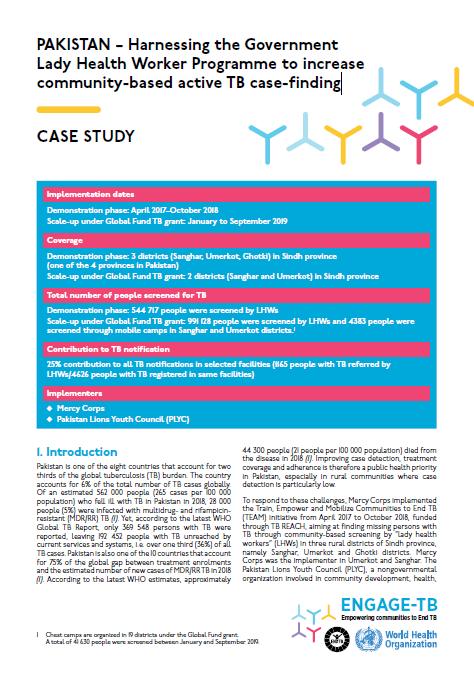Pakistan – Harnessing the Government Lady Health Worker Programme to increase community-based active TB case-finding
Case study

Overview
Pakistan is one of the eight countries that account for two-thirds of the global tuberculosis (TB) burden. The country accounts for 6% of the total number of TB cases globally. Of an estimated 562 000 people (265 cases per 100 000 population) who fell ill with TB in Pakistan in 2018, 28 000 people (5%) were infected with multidrug- and rifampicinresistant (MDR/RR) TB (1). Yet, according to the latest WHO Global TB Report, only 369 548 persons with TB were reported, leaving 192 452 people with TB unreached by current services and systems, i.e. over one third (36%) of all TB cases. Pakistan is also one of the 10 countries that account for 75% of the global gap between treatment enrolments and the estimated number of new cases of MDR/RR TB in 2018. According to the latest WHO estimates, approximately 44 300 people (21 people per 100 000 population) died from the disease in 2018. Improving case detection, treatment coverage and adherence is therefore a public health priority in Pakistan, especially in rural communities where case detection is particularly low.
To respond to these challenges, Mercy Corps implemented the Train, Empower and Mobilize Communities to End TB (TEAM) initiative from April 2017 to October 2018, funded through TB REACH, aiming at finding missing persons with TB through community-based screening by “lady health workers” (LHWs) in three rural districts of Sindh province, namely Sanghar, Umerkot and Ghotki districts. Mercy Corps was the implementer in Umerkot and Sanghar. The Pakistan Lions Youth Council (PLYC), a nongovernmental organization involved in community development, health, human rights and education, was the implementer in the third district, Ghotki. This intervention was later scaled up in two of these districts, Sanghar and Umerkot, through the 2018–2020 grant from the Global Fund to Fight AIDS, Tuberculosis and Malaria (Global Fund) and was ongoing at the time of writing. This case study covers the activities until September 2019
